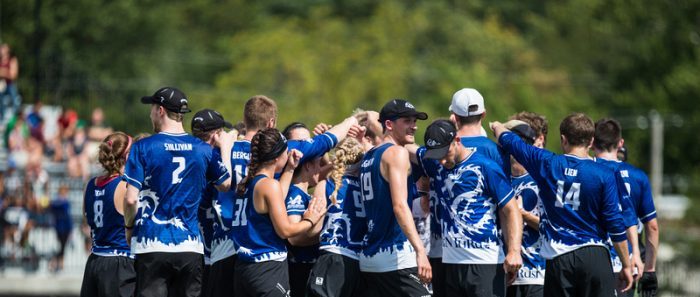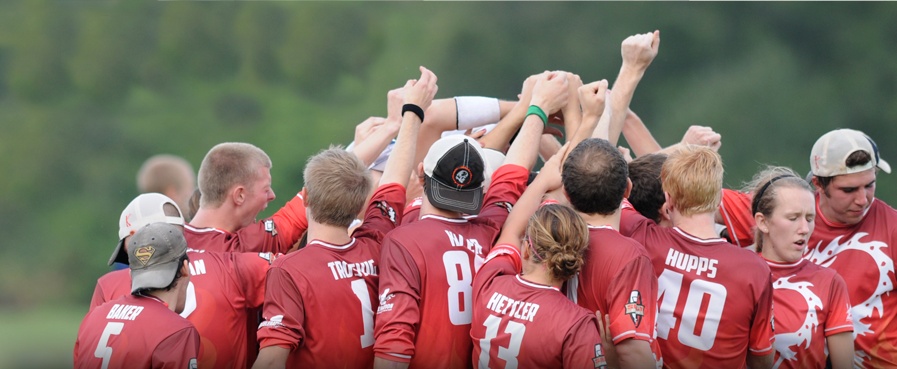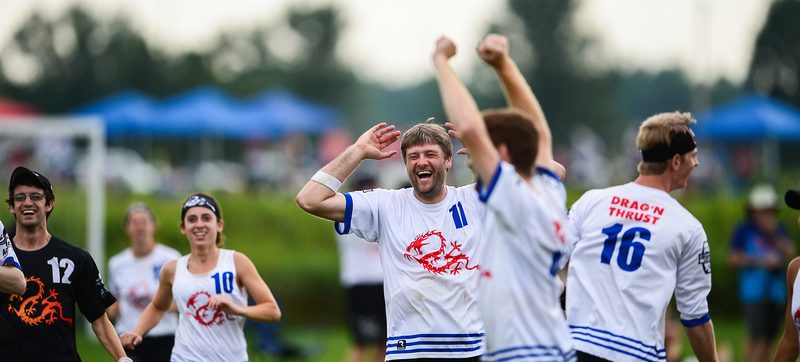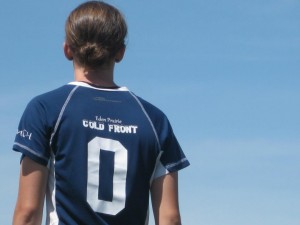Almost every sports team I ever played on growing up had a coach. Whether it was soccer, badminton (yes, badminton), Nordic skiing, or Ultimate, there was always someone devoting his or her time to instructing a bunch of kids on how to excel at their chosen sport. I think coaches play a very critical role for youth teams outside of just a logistical necessity for the age group. My experiences playing on high school and college teams are a lot of the reasoning behind why I make the time to coach and contribute to youth ultimate.
After having my first taste of ultimate playing in a middle school intramural league, a few of my friends and I decided to join our high school’s girls ultimate team our freshman year. At the time there was no coach specifically for the girls team. There were a few coaches that were in charge of the high school ultimate program, meaning the girls team in addition to both the boys varsity and junior varsity teams. As the boys program was more developed and competitive their two teams seemed to receive the majority of the coaches’ attention during practices, which left the captains of the girls team to lead practices basically on their own. Coming from other competitive sports that consistently had strong, dedicated coaching structures for the girls’ programs, I had not experienced a captain led team before. Being relatively new to ultimate, I struggled in picking up the basic skills from my peers who were still trying to learn the same skills themselves. On top of that, I found fitting in with the upper classmen core of the team a bit difficult. After attending a few practices and a game or two I ended up quitting.
I eventually returned to the girls ultimate team at the end of my senior year after some persuasion from a couple girls I played soccer with (thanks Caty Ferris and Tess Hoerle). The high school program as a whole had acquired more coaches and the girls program now had at least one coach attending all practices and games. I quickly learned to love the sport and obviously haven’t stopped playing since.
Now, I am not saying the captains of the team that year did a bad job or that coach-less programs are inferior by any means. There are many programs that are captain lead that do a great job of retaining new players and being successful. However the majority of these teams seem to be at the college level, and have this structure out of necessity rather than by choice. And I do think one of the challenges that face youth ultimate is that younger players coming from different, more traditional competitive sports, as I was freshman year, may be turned off from ultimate due to the lack of a consistent coaching role.
I think there are a few reasons why having a coach was so important for me to grasp on to Ultimate as a high school player and why the role is so important for youth programs as a whole. The first one being that a coach provides someone to confide in other than your peers. For some players it may be uncomfortable to admit weakness to friends/teammates. For anyone developing a new skill there is always some period of struggle that comes with it. When I hit that rough patch as a freshman in high school I knew I needed some additional help and advice. I remember wishing I had a coach I could talk to rather than the extremely intimidating (at least from my 15 year old perspective) senior captains. Now that I’m “older” and have been playing for a number of years with several different teams, I find it much less intimidating to talk to my more veteran peers, but when you’re new to high school and to the sport anything that eases that transition can make all the difference in the world.
A coach is also a source of motivation that can’t be matched by teammates or parents. While I do think the basis of that motivation may be similar, as it is likely rooted in competition or fulfillment of expectations, I feel like each of these three groups provides a different style of motivation. In most instances a coach is an expert at the given sport or at least that is the way the players view him or her. When I was a senior getting back into ultimate and just starting to build a solid understanding of the game, I thought our coaches were frisbee gods and I definitely looked up to them. I also had a similar sense of admiration for some of my more experienced teammates, but I think that came more from my competitive nature than anything else. If teams have coaches that players look up to and respect, I think that can be a large motivator and it can be easier to learn from someone in such a clear authority role. No player wants to let their coach down and receiving praise from a coach you look up to is excellent positive reinforcement especially in youth sports.
Moving from the positive side of feedback to the negative, receiving critiques is most impactful coming from a coach. As a young ultimate player, I rarely took constructive criticism from my parents very seriously as they barely understood the game and would only give general advice applicable to just about any of the sports I played. Feedback coming from teammates, although generally valuable, can be difficult to absorb and apply as well. In my experience with high school programs, as a player and now coach, delivering meaningful, helpful criticism in a delicate fashion between teammates is not something most high school players have mastered. Having a coach deliver constructive criticism is an effective and appropriate channel to challenge a young player to improve.
So if someone were to ask me why I put in time to coach/help out at the middle school, high school, and college levels it’s not because of the money or the fame. It is because coaches provide a few things that teammates, captains, and parents just can’t quite provide. Coaches make learning to love the game easier, especially for athletes coming from other sports.
I have been working with the Eden Prairie High School teams in some form or another since I graduated and now that I graduated from the University of Minnesota I still attend the team’s practices and try to contribute where I can. I have also started assistant coaching at Mounds View High School this year and this will be my second year coaching in the Minnesota Youth Ultimate middle school league. Sometimes the craziness of life makes it a challenge to take the time to show up to the practices, high school games, and middle school league every week, but from my experience as a young ultimate player I am definitely grateful our coaches made the time for me and the team.
I found that I’ve gained a lot from the players I coach too. Of course there is the sense of fulfillment that comes with volunteering, but I’ve also been surprised at how differently I see the game when I’m coaching as opposed to playing. Coaching gives me the time and perspective to evaluate game scenarios through practices and drills differently than if I was a player receiving the instruction. This could probably be an entirely new blog topic, but coaching has definitely allowed me to grow as both a person and a player.
If you have the time to contribute to youth ultimate whether in a coaching capacity or not, there is always a need for volunteers! Whether you’ve got the time to volunteer for a day at the High School State Tournament in June or if you have a couple of hours to help out on Sundays with the Minnesota Middle School Ultimate League, you would be making a positive impact for these youth programs and the growth of our sport. You can find information about volunteer opportunities at the Minnesota Youth Ultimate website: http://www.mnyu.org/






